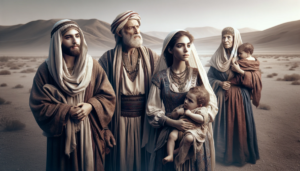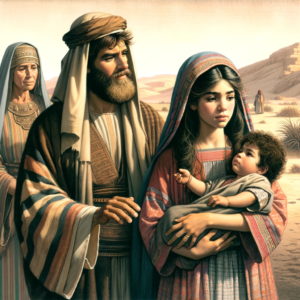Sumario
ToggleIntroduction:
In the series “Biblical Reflections and Moral Dilemmas,” today we explore the complex story of Abraham, Hagar, and Ishmael, an episode filled with ethical, emotional, and faith-related issues.
This narrative, situated at the heart of the Book of Genesis, takes us on a deep dive into Abraham’s decisions and their broad implications. We will unravel the layers of this story to understand the moral choices faced by Abraham and how they resonate across different religious traditions.
Historical Context:
Abraham, a central figure in Judaism, Christianity, and Islam, faces a significant challenge in his journey of faith. After receiving the divine promise that he would be the father of a great nation, he finds himself at a crossroads, as his wife Sarah is unable to conceive.
In this context, Sarah offers her servant Hagar to Abraham, which leads to the birth of Ishmael. This decision is deeply rooted in the norms and cultural understandings of the time, reflecting the social practices and religious beliefs of the period.

The Dilemma:
The complexity of Abraham’s dilemma intensifies with the birth of Isaac, the son promised to him and Sarah. When Sarah demands that Abraham expel Hagar and Ishmael, he finds himself at a moral crossroads: loyalty to his wife and the divine promise related to Isaac, versus his love and responsibility towards his first son, Ishmael.
This conflict is not just a matter of personal choice but also reflects tensions between cultural norms, moral imperatives, and faith.
Theological and Historical Perspectives:
- The Divine Promise: Abraham is aware of the promises made by God to both Isaac and Ishmael. How could he honor both promises, especially when they seem to be in conflict?
- Cultural Context: Sarah’s decision to offer Hagar to Abraham and Abraham’s subsequent decision to send Hagar and Ishmael into the wilderness are deeply influenced by the cultural and religious context of the time. Understanding these aspects is crucial for a complete comprehension of the story.
- Interpretations and Legacies: Jewish, Christian, and Islamic traditions offer different interpretations of these events, each highlighting unique elements of faith, obedience, and divine providence.
Conclusion and Reflection:
The story of Abraham, Hagar, and Ishmael presents us with a complex portrait of the difficulties faced in making decisions under extraordinary circumstances. It challenges our notions of sacrifice, faith, and the consequences of the choices we make.
Different interpretations of this narrative in various religious traditions help us better understand ethics, responsibility, and principles of faith. This biblical episode invites us to deep reflection on moral dilemmas and the difficult choices we often face in our own lives.
Character Analysis and Emotional Implications:
The story is also rich in its emotional implications. Abraham, in making his decision, not only faces a moral dilemma but also deals with the emotional weight of his actions on his family.
Hagar, a servant in a foreign land, faces uncertainty and fear, while Ishmael becomes a central figure in a family and religious drama. These elements add a layer of emotional complexity to the account, making it more relatable and introspective.

Contemporary Implications:
This story has significant implications in the contemporary world, particularly regarding issues of faith, family loyalty, and ethics. It challenges us to consider how our beliefs and values influence our decisions, and how we treat others in situations of conflict and difficult choices.
The narrative of Abraham, Hagar, and Ishmael encourages us to reflect on how we balance different responsibilities and loyalties in our own lives.
Final Considerations and Practical Application:
Reflecting on the journey of Abraham, Hagar, and Ishmael, we are reminded of the importance of examining biblical stories not just as historical accounts but also as sources of wisdom and guidance for contemporary challenges.
The lessons learned from this narrative can provide valuable insights into navigating complex moral dilemmas, balancing faith, compassion, and justice.
For more information, watch the video: Abraham’s Choice
